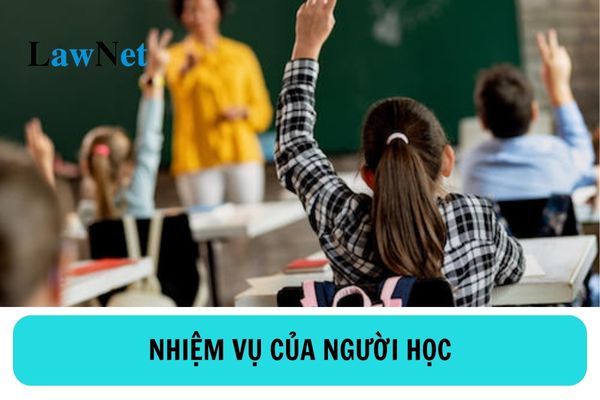Vietnam: What are the duties of learners in educational institutions?
Who are the learners?
According to Article 80 of the Education Law 2019 of Vietnam, learners are persons currently learning at educational institutions of the national educational system. Learners include:
- Children at preschool education institutions;
- Students at general education institutions, vocational training classes, vocational - continuing education centers, vocational education centers, vocational secondary schools and pre-university schools;
- Students at colleges and universities;
- Students at institutions providing master education;
- Doctoral candidates at institutions providing doctoral education;
- Learners of continuing educational programmes.

What are the duties of learners in educational institutions? Who are the learners? (Image from the Internet)
What are the duties of learners in educational institutions?
According to Article 82 of the Education Law 2019, the duties of learners are as follows:
- Perform learning and training tasks according to educational programmes and plans, code of conduct of educational institutions.
- Respect teachers, officials, and workers in the education sector; unite, help each other in learning and training; adhere to the rules, regulations, and guidelines of educational institutions; comply with legal provisions.
- Participate in labour and social activities, environmental protection activities appropriate to their age group, health and ability.
- Preserve and protect properties of educational institutions.
- Contribute to the building, protection and development of the traditions of educational institutions.
What rights do learners have?
According to Article 83 of the Education Law 2019, the rights of learners are as follows:
Learners have the right to:
- Receive education and training so as to develop comprehensively and realize their potentials to the fullest.
- Receive respect; equal opportunities in education and learning; to have their talents, gifts, creations and inventions developed; to receive full information concerning their own learning and training.
- Have the possibility of leaping grades, shortening programme duration, learning at an age higher than regulated, extending programme duration or repeating class, be enabled to learn educational programmes as prescribed by law.
- Learn in a safe and healthy educational environment.
- Be awarded degrees/diplomas or certificates after completing educational levels, training qualifications or completing educational programmes as prescribed by law.
- Participate in collective activities in educational institutions in accordance with the law.
- Use infrastructure, libraries, equipment and facilities assigned to learning, cultural, sporting, athletic activities at educational institutions.
- Submit, directly or through their legal representatives, to educational institutions measures for the improvement of educational institutions, to protect learners' rights and interests.
- Benefit from preferential State policies in recruitment into State agencies upon graduation with excellent records and good conduct.
- Elect representatives for school council as prescribed by law.
What policies does the State have for learners?
According to Section 2, Chapter V of the Education Law 2019, the State has the following policies for learners:
- Educational Credit
The State has preferential credit policies regarding interest rates, conditions, and loan terms to facilitate learners' studies. Private investment in educational credit activities is encouraged.
- Scholarships, Social Allowances, Tuition Fee Exemptions, Reductions, and Support for Tuition Fees and Living Expenses
+ The State provides scholarships to encourage learning for students with excellent academic results at specialized and talented schools as prescribed in Article 62 of the Education Law 2019 and learners with good and above-average results at vocational and higher education institutions;
It provides policy scholarships for students under the recruitment system, students of university preparatory schools, boarding ethnic minority schools, and vocational education institutions for war invalids and the disabled.
+ The State has policies on allowances and tuition fee exemptions and reductions for learners who are entitled to social policy, ethnic minorities in areas with particularly difficult socio-economic conditions, orphans, homeless children, the disabled, and those from poor and near-poor households.
+ The State encourages organizations and individuals to provide scholarships or allowances to learners as prescribed by law.
+ Students of pedagogical institutions receive support for tuition fees and living expenses throughout the course of study.
Students who receive support for tuition fees and living expenses and do not work in the education sector or do not work long enough as prescribed within 02 years after graduation must reimburse the expenses provided by the State.
The maximum repayment period is equivalent to the training duration.
Students of pedagogical institutions enjoy policies on scholarships to encourage learning, social allowances, tuition fee exemptions, and reductions prescribed in Clauses 1 and 2 of Article 85 of the Education Law 2019.
- Free or Reduced Rates for Public Service Fees for Students
Students are entitled to policies on free or reduced rates when using public services in transport, entertainment, visiting museums, historical sites, and cultural works as prescribed by the Government of Vietnam.
- Recruitment Policies
+ The State implements recruitment into intermediate, college, and university levels according to recruitment policies for students who are ethnic minorities with very few people; ethnic minority students in areas with particularly difficult socio-economic conditions where there are few or no officials and public employees of ethnic minority origin; and has policies to source recruits and create favorable conditions for these subjects to study in boarding ethnic minority schools and extend the university preparatory period.
+ Provincial People's Committees, based on local needs, propose, allocate recruitment quotas; appoint people for education according to approved standards and quotas; recruit and arrange jobs for learners after graduation.
Educational institutions are responsible for supporting learners under recruitment policies to ensure output quality.
+ Learners under recruitment policies are responsible for returning to work in their hometowns where they were appointed; be recruited and arranged for jobs.
+ The Government of Vietnam prescribes in detail the standards and beneficiaries of recruitment policies; organization of recruitment policy implementation and recruitment of graduates under recruitment policies.
- Rewards for Learners
Learners with achievements in studying and training are rewarded by educational institutions and educational management agencies; in exceptional cases, rewards are given as prescribed by law.

